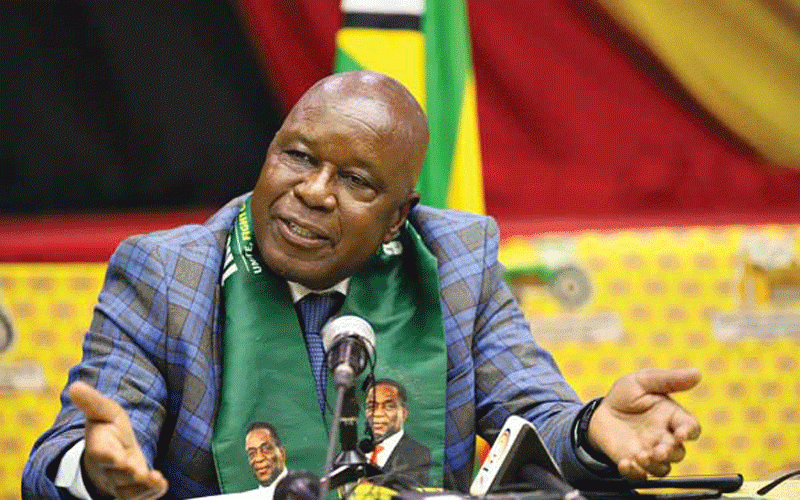
PRESIDENT Robert Mugabe yesterday made additions to his already bloated Cabinet at a time the country’s economy is heavily choked by excessive government expenditure in the face of ever-deteriorating revenue collections.
By Everson Mushava/Xolisani Ncube
The appointment of 14 more ministers, which appears to be a consolidation of Vice-President Emmerson Mnangagwa’s power base in the Zanu PF succession politics, comes at a time government has made an undertaking to adhere to International Monetary Fund recommendations to reduce its expenditure bill.
Yesterday’s Cabinet reshuffle was the third in nine months.
Zimbabwe, with a population of around 13 million, now has more than 72 ministers, almost the same size as neighbouring South Africa, whose population is over 55 million people.
Government now requires more than $3 million to provide top-of-the-range vehicles, perks and allowances for the new team of ministers.

On average, a Cabinet minister gets a new Mercedes-Benz which could cost as much as $170 000 and a new all-terrain vehicle valued at about $110 000, a monthly salary of between $2 000 and $4 500, fuel and other allowances such as airtime, security aides, State maids and housing, among other perks, further burdening the taxpayer.
- Chamisa under fire over US$120K donation
- Mavhunga puts DeMbare into Chibuku quarterfinals
- Pension funds bet on Cabora Bassa oilfields
- Councils defy govt fire tender directive
Keep Reading
Political analysts yesterday roundly condemned Mugabe’s “recycling of deadwood” and described the move as insensitive and a sign of desperation to hold on to power at all costs.
Academic and political analyst Ibbo Mandaza said: “I have not yet seen the entire Cabinet line-up, but my comment would be ‘Oh poor Zimbabwe, 14 new ministers! . . . eish my God’.”
University of Zimbabwe political science lecturer Eldred Masunungure said Mugabe’s appointments had nothing to do with the economy, but were meant to consolidate his grip on power ahead of the 2018 general elections.
“This is not a development Cabinet, but a political gathering that wants to consolidate power at all costs even if it means rendering ordinary people to poverty, Zanu PF has proved it can do so,” he said.
“Don’t expect anything in terms of economic development from such a Cabinet, because if you look at the new ministries created and the calibre of people appointed to other portfolios, you don’t see anyone with an idea of how to grow the economy. It is an election Cabinet.”
He queried the logic behind the creation of the Ministry Without Portfolio.
“Why create a ministry without portfolio when we have no money to fund our public workers? It’s being insensitive to the plight of ordinary workers and shows the true calibre of Zanu PF,” Masunungure said.
The swearing-in of the new ministers was meant to fill posts left vacant following the sacking of some ministers allegedly linked to former Vice-President Joice Mujuru.
Mujuru was kicked out of both Zanu PF and government on allegations of plotting to kill Mugabe.
Former Manicaland Provincial Affairs minister Chris Mushohwe was appointed Media, Information and Broadcasting Services minister, taking over from Public Service minister Prisca Mupfumira who acted in that capacity following the redeployment of Jonathan Moyo to the Higher and Tertiary Education ministry two months ago.
Mugabe’s nephew, Patrick Zhuwao, who had been relegated from government corridors after he lost the party’s primary elections in Zvimba East in 2013, bounced back to replace Mushohwe as Indigenisation minister.
Long-time Zanu PF chief whip Joram Gumbo becomes Transport minister taking over from Obert Mpofu, who was moved to Economic Planning, previously held by Simon Khaya Moyo.
Khaya Moyo was reassigned to Policy Co-ordination in the President’s Office.
Besides reshuffling ministers, Mugabe also created two new ministries — Rural Development and Preservation of Cultural Heritage and Policy Co-ordination.
Makhosini Hlongwane was appointed Minister Without Portfolio.
Among those sworn-in as deputies are: Edgar Mbwembwe (Foreign Affairs); Obedingwa Mguni (Home Affairs); Berita Chikwama (Lands and Rural Resettlement); Chris Chingosho (Local Government, Public Works and National Housing); Michael Madanhi (Transport); Aldrin Musiiwa (Health); Thokozile Mathuthu (Media); Tshinga Dube (War Veterans); Annastacia Ndhlovu (Tourism); Monica Mutsvangwa (Economic Planning) and Tapiwanashe Matangaidze (Public Service).
Mutsvangwa was moved from the media portfolio to the Economic Planning ministry, where she will be Mpofu’s deputy.
MDC-T spokesperson Obert Gutu said Mugabe’s government was struggling to pay civil servants and there was no need to further strain taxpayers.
“This is a complete disgrace. Our roads and railway infrastructure are dilapidated and electricity is only available for about six hours a day countrywide,” he said.
“Public hospitals and clinics don’t have any medicines and the whole public health delivery system has virtually collapsed. But Mugabe is not bothered one bit.”
Of the 14 ministers appointed yesterday, about six are believed to be linked to the Mnangagwa camp, with three, Hlogwane, Gumbo and Matangaidze coming from Mberengwa in the VP’s Midlands province, where Ndlovu also hails from.
This places Mnangagwa in a strong position to shake off pressure from a faction called G40 believed to be led by Local Government minister Saviour Kasukuwere.
Kasukuwere had his powers trimmed after the supervision of traditional leaders was removed from his portfolio.











